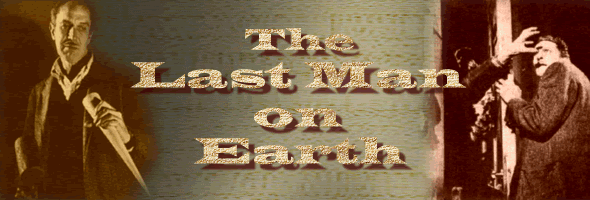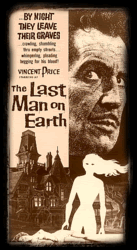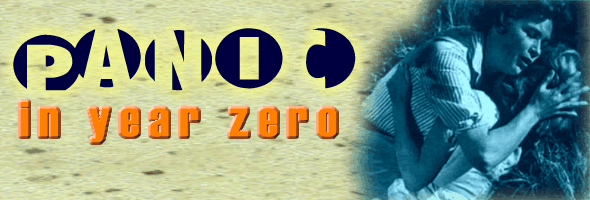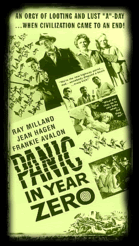
B&W, 1964, 86 mins. Directed by Sidney Salkow and Ubaldo Ragona
Starring Vincent Price, Franca Bettoia, Emma Daniela, Giacomo Rossi-Stuart, Umberto Rau, Christi Courtland / Written by William Leicester and Richard Matheson (Logan Swanson) / Music by Paul Sawtell and Bert Shefter / Cinematography by Franco Delli Colli
Format: Laserdisc - Image / Orion (MSRP $39.95)
Letterboxed (2.35:1) / Digital Mono
Everyone has fantasized about what it might be like to be the last person alive on the planet. Anything you could possibly want would be right there at your disposal. Sounds fun, right? Not quite, at least according to writer Richard Matheson, whose nightmarish short novel I Am Legend was first adapted as The Last Man on Earth, a fascinating, underrated Italian production starring Vincent Price. Matheson was less than thrilled with the results and even used a pseudonym for his screenplay on the final print, but the storyline remained so indelible that it was filmed again in 1971 as The Omega Man (a radically different interpretation). The past few years have seen frequent announcements that a third version is still in the works, at one time with talent ranging from director Ridley Scott to actor Arnold Schwarzenegger attached to the project. Robert Morgan (Price), named Neville in the book, has barricaded himself into a decaying house in the middle of a deserted city. Occasionally Morgan ventures out into the daylight and drives through the desolate streets, where bodies litter the pavement and buildings crumble to the ground. At home, Morgan hangs garlic and mirrors in front of the doors and nails boards over the windows. At night, hellish voices call his name, and ghastly arms attempt to burst their way into the house. In flashbacks, the last days of human civilization are shown submitting to a rampant worldwide virus which causes its victims to transform into vampires and feed on the living. Worse, the victims retain some semblance of their original personalities but have become singleminded and bloodthirsty. While Morgan played a key role in the scientific research of the virus, he was spared, perhaps because of a bat bite, while his family succumbed. His former research partner, Ben (Giacomo Rossi-Stuart, also in Mario Bava's Kill Baby, Kill!), has become a leader among the vampiric predators, but as Morgan soon discovers, his problems are even greater than he previously imagined. When a seemingly human woman suddenly appears, Morgan believes he may have found the key to rebuilding society, but fate holds a few nasty surprises in store.
Virtually impossible to see since its original theatrical run in the '60s, The Last Man on Earth has primarily been available via poor late night TV screenings and awful public domain bootleg tapes. The new Image laserdisc unveils what must be considered a completely new film to most horror fanatics. The detail and care with which this transfer has been prepared restore a sense of dignity and anguish which has never really been conveyed on video before. The eerie widescreen photography uses every anamorphic inch to create a stark, haunting atmosphere; even the interior shots are effectively arranged (love those bare lightbulbs!). Shooting this film in black and white gives it a queasy, almost documentary feeling at times, a quality which has led to numerous comparisons to George Romero's later Night of the Living Dead. In fact, much of Romero's work owes a nod to this film; in one memorable sequence that could have stepped out from Dawn of the Dead, Morgan attempts to track down the body of his daughter and winds up at a military site where, illuminated only by hellish firelight, soliders hurl hundreds of burning corpses into a giant pit, now transformed into a giant crematorium. Even Matheson's startling finale has been more or less retained with some slight restructuring; modern audiences might still be startled by the manner in which the story resolves itself. Price's performance has never been singled out as one of his best for some reason, but he makes a fine intellectual hero and handles the few action sequences with great skill. While the remake beefed up the action considerably, this remains a work primarily focused on mood and ideas, with Price a fine representative of mankind wobbling on its final, wounded legs. For anyone continuing to build their laserdisc collection, this is simply a must.
B&W, 1962, 95 mins. Directed by Ray Milland
Starring Ray Milland, Jean Hagen, Frankie Avalon, Mary Mitchel, Richard Bakalyan, Neil Nephew / Music by Les Baxter / Written by John Morton and Jay Simms / Produced by Arnold Houghland and Lou Rusoff / Cinematography by Gilbert Warrenton
Letterboxed (2.35:1) / Digital Mono
Accompanying The Last Man on Earth for its widescreen debut is Ray Milland's most popular directorial effort, Panic in Year Zero!. Image has appropriately dubbed these "Apocalyptic Nightmares," and Milland's film certainly fits the bill. Though no classic by any means, Panic should keep sci-buffs occupied and occasionally intrigued by some of the more unsettling concepts it advances, and the depiction of a society gradually feeding on itself until the few "moral" people close in on themselves has since cropped up everywhere from The Hills Have Eyes to The Trigger Effect.
Harry and Ann Baldwin (Milland and Jean Hagen (best known as Lina Lamont in Singin' in the Rain - "I kin't stan' him!") are driving their teenage children off for a weekend vacation when they notice some strange lights flickering behind them. Is it lightning? Nope; Los Angeles has been wiped out by a nuclear attack. One by one the major cities are destroyed, and the family heads for the wilderness to escape radiation and vandals. Along the way, they meet considerable opposition from townspeople on the local routes ("We don't want none of you L.A. people here!"), and Harry even winds up punching out a gas station attendant who decides the price of fuel has become just a little overinflated. Though not a visually ravishing film, Panic uses the scope frame to relay character interaction and spatial relationships, so the laser is really the only way to go. The black and white image quality is excellent, and Les Baxter's raucous score is even isolated with effects on the analog track (ditto for Last Man). Though not as historically interesting as its companion piece in this package, this film makes a fine second feature and should have sci-fi nostalgia buffs swooning with fond memories of holocaust movies that were actually pretty entertaining.
 Even if this promising third version never appears, The Last Man on Earth got there first and, the author's reservations aside, did a very good job of presenting the source material and carving its own little niche in the memories of late night TV viewers.
Even if this promising third version never appears, The Last Man on Earth got there first and, the author's reservations aside, did a very good job of presenting the source material and carving its own little niche in the memories of late night TV viewers.

 The son, Rick (Frankie Avalon, who needs to stick to singing), becomes infatuated with Marilyn (Joan Freeman), a bad girl the Baldwins pick up along the way, and the blonde daughter, Karen (Mary Mitchel), gets raped by some no good hoods. Daddy Baldwin resorts to a killing or two as he tries to preserve the family unit, making this either a powerful indictment of American egocentrism or a gung ho plug for the NRA. Either way, the film winds up delivering a moral message about the necessity for starting over and preserving normalcy, with a few kicky thrills along the way.
The son, Rick (Frankie Avalon, who needs to stick to singing), becomes infatuated with Marilyn (Joan Freeman), a bad girl the Baldwins pick up along the way, and the blonde daughter, Karen (Mary Mitchel), gets raped by some no good hoods. Daddy Baldwin resorts to a killing or two as he tries to preserve the family unit, making this either a powerful indictment of American egocentrism or a gung ho plug for the NRA. Either way, the film winds up delivering a moral message about the necessity for starting over and preserving normalcy, with a few kicky thrills along the way.
